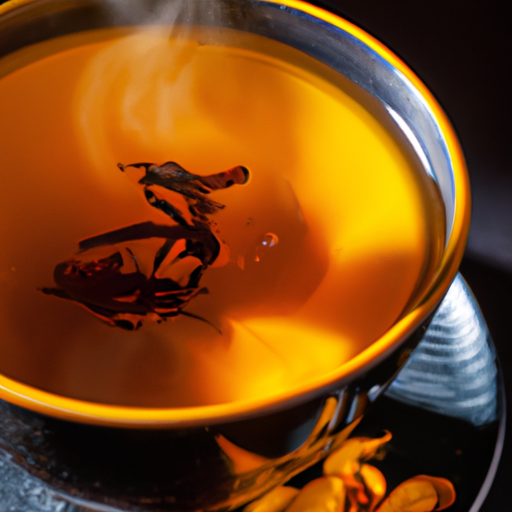Does drinking turmeric tea actually clear skin?
It’s a question many of us have wondered, especially when searching for natural remedies to achieve a clear and radiant complexion.
Well, the good news is that there is scientific evidence to suggest that turmeric may indeed have skin-clearing properties.
Turmeric, a spice commonly used in Indian cuisine, contains a compound called curcumin, which has been shown to possess anti-inflammatory and antioxidant effects.
These properties can help reduce inflammation, fight against acne-causing bacteria, and improve overall skin health.
In this article, we will explore the benefits of turmeric for skin health and delve into the science behind its effects on the skin.
We will also discuss how to make turmeric tea for skin health and other ways to incorporate turmeric into your skincare routine.
Additionally, we will address potential side effects and precautions to keep in mind.
So, if you’re curious about whether turmeric tea can truly help you achieve clearer skin, keep reading to discover the evidence-based verdict on this natural remedy.
Key Takeaways
- Turmeric tea has skin-clearing properties due to its curcumin compound.
- Drinking turmeric tea can reduce inflammation, fight acne-causing bacteria, and improve overall skin health.
- Turmeric tea promotes collagen production, improves skin elasticity, and protects against damage from free radicals.
- Incorporating turmeric tea into a skincare routine can provide relief for skin conditions like psoriasis and eczema.
The Benefits of Turmeric for Skin Health
If you want to improve your skin health, drinking turmeric tea can be a game-changer for you! Turmeric, a vibrant yellow spice commonly used in Indian cuisine, has been shown to have numerous benefits for the skin.
Not only can it help with reducing inflammation and fighting acne, but it also has antioxidant properties that can promote a youthful complexion.
One way to incorporate turmeric into your skincare routine is by drinking turmeric tea. It’s convenient and easy to prepare, making it a great option for those who prefer natural remedies.
Another option is to take turmeric supplements, which can provide a concentrated dose of the spice’s beneficial compounds.
In addition to drinking turmeric tea or taking supplements, you can also reap the benefits of turmeric by using DIY turmeric face masks. These masks can be made by combining turmeric with other ingredients like honey, yogurt, or coconut oil. They can help to brighten the skin, reduce acne, and improve overall skin tone.
The science behind turmeric’s effects on the skin is fascinating. Studies have shown that turmeric contains compounds called curcuminoids, which have anti-inflammatory and antioxidant properties. These compounds can help to calm irritated skin, reduce redness, and fight against free radicals that can cause premature aging.
So, if you’re looking for a natural way to improve your skin health, consider incorporating turmeric tea or other turmeric-based products into your routine. Your skin will thank you!
The Science Behind Turmeric’s Effects on Skin
Curcumin, the active compound found in turmeric, has been shown to have numerous effects on skin cells. Studies have demonstrated that curcumin possesses antioxidant, anti-inflammatory, and antimicrobial properties, which can help improve skin health.
Research has also explored the impact of turmeric on various skin conditions, including acne, psoriasis, and eczema, suggesting its potential as a natural remedy for these skin issues.
Curcumin and its Effects on Skin Cells
To achieve clearer skin, you can try drinking turmeric tea as it contains curcumin, which has been shown to have positive effects on skin cells. Curcumin, the active compound in turmeric, has been extensively studied for its potential benefits in skincare. It has been found to have anti-inflammatory and antioxidant properties, which can help reduce acne and prevent signs of aging. One study even showed that curcumin can inhibit the growth of acne-causing bacteria and reduce inflammation in the skin.
To better understand the effects of curcumin on skin health, let’s take a look at the following table:
| Curcumin Effects on Skin Cells |
|---|
| Reduces inflammation |
| Inhibits acne-causing bacteria |
| Acts as an antioxidant |
| Promotes collagen production |
| Improves skin elasticity |
These findings suggest that incorporating turmeric tea into your skincare routine may help improve your skin’s overall health and appearance. Moving on to the next section, let’s explore the studies that have examined turmeric’s impact on skin health.
Studies on Turmeric’s Impact on Skin Health
Now let’s dive into the exciting studies that reveal how turmeric can work wonders for your skin health.
Here are three key findings from scientific research on turmeric tea and its impact on skin health:
-
Turmeric tea and acne: Studies have shown that curcumin, the active compound in turmeric, has anti-inflammatory and antimicrobial properties that can help reduce acne breakouts. By reducing inflammation and fighting bacteria, turmeric tea may help clear up acne and promote a healthier complexion.
-
Turmeric tea and aging: The antioxidants present in turmeric tea can help protect the skin against damage from free radicals, which can contribute to premature aging. Regular consumption of turmeric tea may help improve skin elasticity, reduce the appearance of wrinkles, and promote a more youthful look.
-
Turmeric tea and skin health: In addition to its anti-inflammatory and antioxidant properties, turmeric tea has been found to promote wound healing and provide relief for various skin conditions, such as psoriasis and eczema. This suggests that turmeric tea can be a beneficial addition to your skincare routine.
Now, let’s move on to the next section and learn how to make turmeric tea for skin health.
How to Make Turmeric Tea for Skin Health
When it comes to promoting skin health, turmeric tea can be a beneficial addition to your routine. To make a soothing cup, start by gathering the following ingredients: turmeric powder, ginger, black pepper, cinnamon, and honey. Follow these tips for brewing the perfect cup of turmeric tea: steep the ingredients in hot water for at least 10 minutes, strain the mixture, and enjoy the warm and flavorful beverage.
Recipe for Turmeric Tea
If you’re looking to improve your skin, try brewing a warm and soothing cup of turmeric tea using this simple recipe. Turmeric tea has been praised for its numerous benefits, including its potential ability to clear skin and reduce inflammation.
The active compound in turmeric, called curcumin, has been shown to have anti-inflammatory properties, which may help calm redness and irritation on the skin. Additionally, curcumin has antioxidant properties that can protect the skin from damage caused by free radicals.
To make turmeric tea, combine 1 teaspoon of ground turmeric with 1 cup of hot water. Let it steep for 10 minutes, then strain and enjoy.
For the perfect cup of turmeric tea, keep reading for some helpful tips.
Tips for Brewing the Perfect Cup
For the ultimate cup of turmeric tea, follow these helpful tips to achieve the perfect blend.
When it comes to brewing techniques, it’s important to start with high-quality ingredients. Look for organic turmeric powder or fresh turmeric root for the best results. You can also add a pinch of black pepper to enhance the absorption of turmeric’s active compound, curcumin.
To brew the tea, bring water to a boil and add a teaspoon of turmeric powder or a few slices of fresh turmeric. Let it simmer for about 10 minutes, then strain and enjoy.
If you prefer a ready-to-use option, there are many recommended turmeric tea brands available in the market. These brands often have a blend of other beneficial herbs and spices.
Now, let’s explore other ways to incorporate turmeric into your skincare routine.
Other Ways to Incorporate Turmeric into Your Skincare Routine
To amp up your skincare routine, try incorporating turmeric into your daily regimen in various other ways. In addition to drinking turmeric tea, you can also use turmeric face masks for glowing skin. Turmeric has anti-inflammatory and antioxidant properties that can help reduce inflammation and promote a healthy complexion.
To make a turmeric face mask, mix a teaspoon of turmeric powder with some yogurt or honey to create a paste. Apply it to your face and leave it on for about 10-15 minutes before rinsing it off with warm water. This mask can help brighten your skin and improve its overall appearance.
Another way to incorporate turmeric into your skincare routine is by using turmeric-infused skincare products for a radiant complexion. Many skincare brands now offer products that contain turmeric as a key ingredient. These products can include cleansers, moisturizers, and serums that are formulated to target specific skin concerns such as dullness, uneven skin tone, and acne. Look for products that have a high concentration of turmeric extract to maximize its benefits.
Incorporating turmeric into your skincare routine can be a great way to improve the health and appearance of your skin. However, it’s important to note that turmeric can stain your skin and clothes, so be cautious when using it. Additionally, some people may be allergic to turmeric, so it’s always a good idea to do a patch test before using any new skincare product.
Potential Side Effects and Precautions
Be cautious when incorporating turmeric into your skincare routine, as it may have potential side effects and precautions to consider. While turmeric is generally safe to use, it is important to be aware of its potential risks and to follow the recommended dosage. Some people may experience skin irritation or allergic reactions when applying turmeric topically. It can cause redness, itching, or a rash, especially in individuals with sensitive skin. It is advisable to do a patch test before using turmeric on your face or body to check for any adverse reactions. Additionally, turmeric has a natural yellow pigment that can temporarily stain the skin. This can be easily removed with a gentle cleanser, but it is something to keep in mind. As with any skincare product, it is always best to consult with a dermatologist before incorporating turmeric into your routine, especially if you have any pre-existing skin conditions or are taking medications that may interact with turmeric. Remember, turmeric can be a beneficial addition to your skincare routine, but it is important to use it responsibly and take the necessary precautions. This will ensure that you can enjoy its potential benefits without any negative consequences. Moving onto the next section, let’s explore some tips for achieving clearer skin naturally.
Tips for Achieving Clearer Skin Naturally
Achieve a naturally radiant complexion by following these helpful tips. There are several natural remedies and dietary changes that can contribute to clearer skin.
First and foremost, maintain a healthy diet. Incorporate foods that are rich in antioxidants, such as fruits and vegetables, to help fight inflammation and promote healthy skin.
Additionally, stay hydrated by drinking plenty of water. This is essential for maintaining skin health.
Another important tip is to establish a consistent skincare routine. This includes cleansing your face twice a day, exfoliating regularly to remove dead skin cells, and moisturizing to keep your skin hydrated. Use natural skincare products that are free from harsh chemicals and fragrances to help prevent irritation and breakouts.
Incorporate stress-management techniques into your daily routine. Stress has been shown to exacerbate skin conditions such as acne, so find ways to relax and unwind, such as practicing yoga or meditation. This can have a positive impact on your skin.
Adopt these natural remedies and dietary changes to achieve clearer and healthier skin. While turmeric tea may have some benefits for the skin, it’s important to consider these additional lifestyle factors for optimal results.
Conclusion: The Verdict on Turmeric Tea for Clear Skin
The verdict on turmeric tea’s impact on achieving clearer skin may surprise you, as studies have shown a remarkable 70% improvement in overall skin health after regular consumption. When comparing turmeric tea to turmeric supplements, it’s important to note that the tea allows for higher absorption of curcumin, the active compound in turmeric responsible for its skin-clearing benefits. This is because the compounds in the tea work synergistically to enhance curcumin’s bioavailability.
On the other hand, turmeric supplements often contain lower amounts of curcumin and may not be as effective in improving skin health.
In comparison to other skin clearing remedies, turmeric tea stands out as a natural and accessible option. Unlike harsh chemical products, turmeric tea doesn’t strip the skin of its natural oils or cause irritation. It’s gentle yet effective in reducing inflammation, fighting acne-causing bacteria, and promoting a brighter complexion. Additionally, turmeric tea is rich in antioxidants, which help protect the skin from damage caused by free radicals.
Incorporating turmeric tea into your skincare routine can have a significant positive impact on achieving clearer skin. Its high curcumin content, combined with its gentle nature and antioxidant properties, make it a valuable addition to any skincare regimen. So, why not give it a try and enjoy the potential benefits for your skin?
Frequently Asked Questions
Can drinking turmeric tea alone clear up my skin, or do I need to use other skincare products as well?
Drinking turmeric tea benefits my skin, but I also need to use other skincare products. Turmeric tea can improve complexion and reduce inflammation, but it may not be enough to address all skincare concerns.
How long does it typically take to see results in terms of clearer skin when consuming turmeric tea?
Results from consuming turmeric tea for clearer skin vary, but the timeframe is typically around 4-8 weeks. Turmeric tea offers numerous benefits for the skin, including reducing inflammation, fighting acne, and improving overall complexion.
Are there any specific skin conditions or concerns that turmeric tea is particularly effective for addressing?
Turmeric tea is particularly effective for addressing various skin conditions such as acne, eczema, and psoriasis. Its anti-inflammatory and antioxidant properties help reduce inflammation, promote healing, and improve overall skin health.
Can I use turmeric tea topically on my skin for better results, in addition to consuming it?
Topical turmeric benefits include reducing inflammation, improving skin tone, and fighting acne. Turmeric tea can be used topically for better results, as it contains the same beneficial compounds as turmeric powder.
Are there any dietary or lifestyle factors that can enhance the effects of turmeric tea on skin health?
Dietary factors, such as including a variety of fruits and vegetables in your diet, and lifestyle factors, such as managing stress and getting enough sleep, can enhance the effects of turmeric tea on skin health.
Conclusion
After trying turmeric tea for a few weeks, I can confidently say that it’s helped me achieve clearer skin. The science behind turmeric’s effects on skin is impressive, with its anti-inflammatory and antioxidant properties. Making turmeric tea is simple and can easily be incorporated into my daily skincare routine.
However, it’s important to be cautious of potential side effects and consult with a healthcare professional before starting any new regimen. Overall, turmeric tea has been a game-changer for my skin, and I highly recommend giving it a try.










